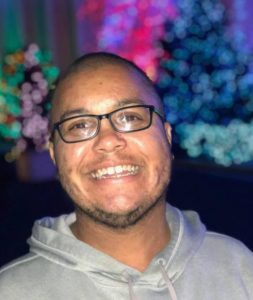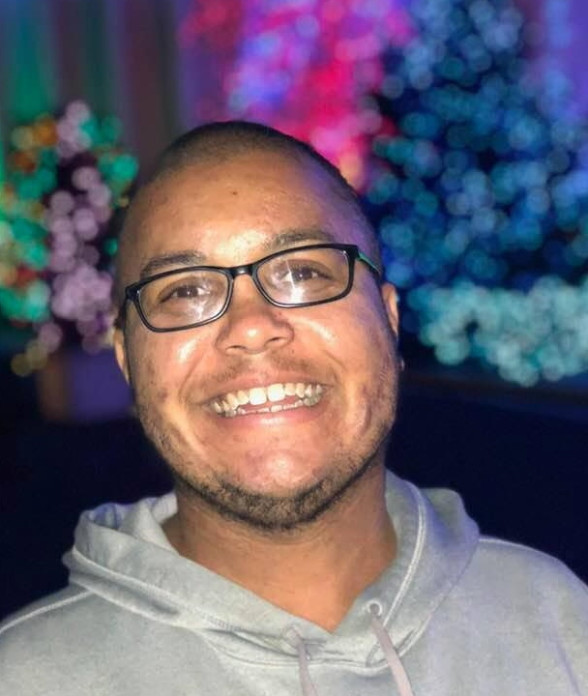 This week DAI features a story of one of our younger members, 33 year old Kris McElroy. As an organisation, we love supporting him, and really enjoy his company in our support groups and online meetings and cafes.
This week DAI features a story of one of our younger members, 33 year old Kris McElroy. As an organisation, we love supporting him, and really enjoy his company in our support groups and online meetings and cafes.
Some of us with younger adult children also find it a little confronting, as we cannot imagine how we would feel if it was one of our own adult children. This must also be how older parents feel of their adult children, diagnosed in their 40's and 50's.
Thanks to DAI board member and co-founder of ODAG, Phyllis for supporing Kris to share his story with us all. He is being profuled for the Glboal Disability Summit in London soon as well. We lovingly call him 'Smiley', as he has a truly radiant smile, and is a joy to be around.
Thanks Kris, from everyone at DAI for sharing your deeply personal story.
Kris McElroy: My Dementia Story
These days it’s easier for me to remember my birthday than my actual age. October 31, 1984. My cognitive abilities have changed. Numbers get to me the most. I can state a date or the time, but I struggle with it’s meaning especially in relationship to other things such as a how much time I have to get somewhere or return a form. Even when I am trying my best and I think I got it, but yet somehow I frequently seem to miss something and I just can’t figure out what it is.
People these days see me walking with my walker, then here me speak and it is assumed I am more likely to have a caregiver next to me than a friend; that I was born this way and am fortunate if I graduated high school; and that I can’t answer my own questions. I know the look and awkwardinteraction all to well of people not knowing how to interact with me. It’s not like I haven’t spent my entire life trying to get people to see my abilities not my disabilities. I was born with a progressive neuromuscular disorder – still the exact type and cause unknown. It effected me in a way that was visible every time I spoke and moved. It is still amazing to me how stigma; stereotypes; and discrimination mixed with lack of awareness, knowledge, understanding, inclusion, and accessibility impact one’s self image and quality of life.
For the longest time I thought for me to be visible, to have a chance, to be seen as human; I had to do my best to be as “normal” as possible. Since, I couldn’t hide my disabilities on the outside, my mind was my gift. My mainframesuper computer that could keep track of everything, my coping mechanism, and also became my hope for the future. Once I had a PhD, someone like me could make it in this world. A PhD would make my disabilities disappear and allow people to actually see my abilities first. It was always on my radar that I won’t have a voice until I earn my PhD. Either a PhD or find a cure for my disabilities. Never once was dementia on my radar. Never once did I think I my mind would change how it is able to function within the world around me. Why would it be, everywhere I looked it was described as the stereotypical old persons disease. I had defeated so many odds and I earned B.S in Psychology, a M.S in Multidisciplinary Human Services. I was in my second year of my Ph.D with a 3.8 average. I had challenges all my life, but I always bounced back or found a way. Until the challenges started becoming more noticeable and it took longer navigate things that were once quick and easy.
I showed signs of what was called “mild to moderate neurocognitivedisorder” in 2015. I don’t remember how old I was, but I still have the report from the testing. Yet, as with most things, the doctor explainsthe results, gives a copy, and then you are sent on the way to continue life. So, I did. I was used to this. What I wasn’t used to was the changes I experienced in spelling, ability to edit, ability to comprehend things, keep track of things, navigating, and the level of confusion. They said I was just young, it was just stress, and with rest it would go away. My whole world was changing, and the challenges were increasing. I didn't know what was happening to me, it was frightening, and it was effecting my functioning. So, my neurologist referred me to testing again. I remember my sister talking about her concerns and mentioning sundowners to the neuropsychologistdoing testing again last summer, the doctor laughing, and then the doctor’s apology and deep concern when she shared and explained the resultsin June 2017, the results that the test results show I have dementia.
Since then, it has been a struggle to get people to believe the diagnosis or to know how to help, and how to find my way – a new way of life.When trying to get services it felt like I had to give up my quality of life in order to have help. That was a very stressful and frustrating process. The only other option given was to go into an assisted living. My sister has been the one person there constantly through it all and it has taken a toll on her too. We both just wish there were more resources, options, services, support. Her unconditional love and support a bright light in my everyday new world.
It’s coming up on a year since the diagnosis of dementia. It is still not clear which type of dementia it is or if it is separated or connected to my other medical conditions. Life looks very different from what it used to. People have come and gone, new faces have brought a sense of joy and hope never imagined at the time of being diagnosed. It was hard to know what to do, what to feel, how to move forward. I spent a lot of time trying to “keep up with the joneses”, but each time that made my symptomsworse. So, I traded in pursuit of my PhD for discovering new ways to help others, engage in my community, explore my talents and share my gifts.Alongthe way it became about just finding a way each day to take it step by step and live well each day whatever that may look like at any moment within any day. Quality of life, according to what that means to me. So, I have adjusted and adapted many things, and as challenges arise or shift, adjusting and adapting occurs time and time again.
Still as with other medical conditions and other things across my life, dementia is a part of my story, but it is not all of my story. It is a part of who I am, but it is not all of who I am. My age does not determine whether I have dementia. My age just means at this point on my life journey, I am a 33 year old chef, artist, writer, volunteer, educator, Special Olympian and athlete, with dementia and other health conditions who has good days and bad days determined to live life well and each moment to the fullest.
